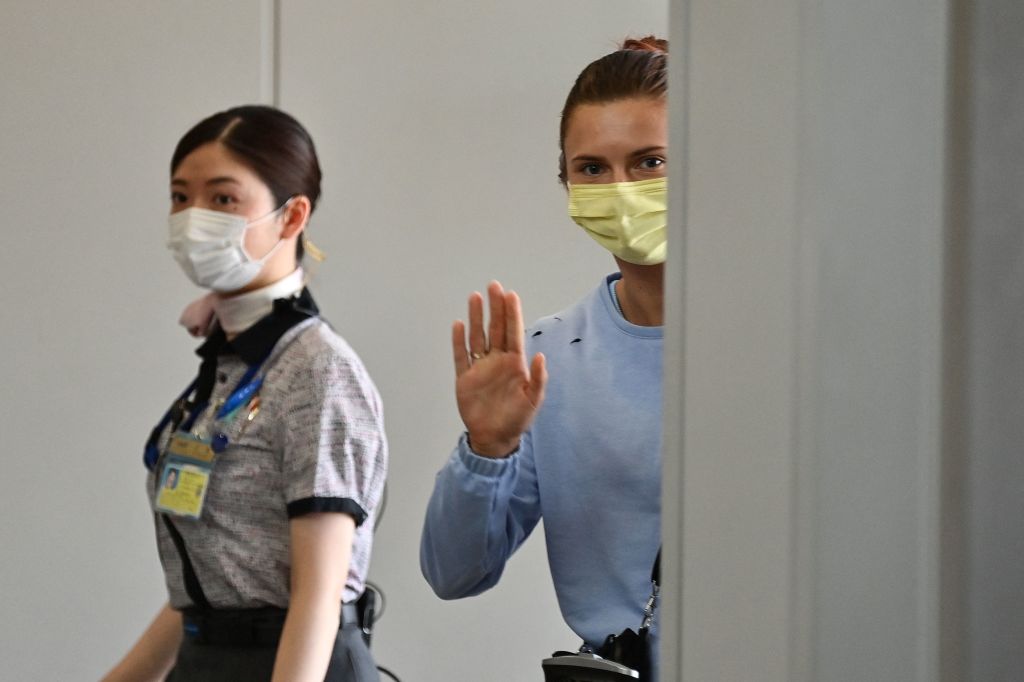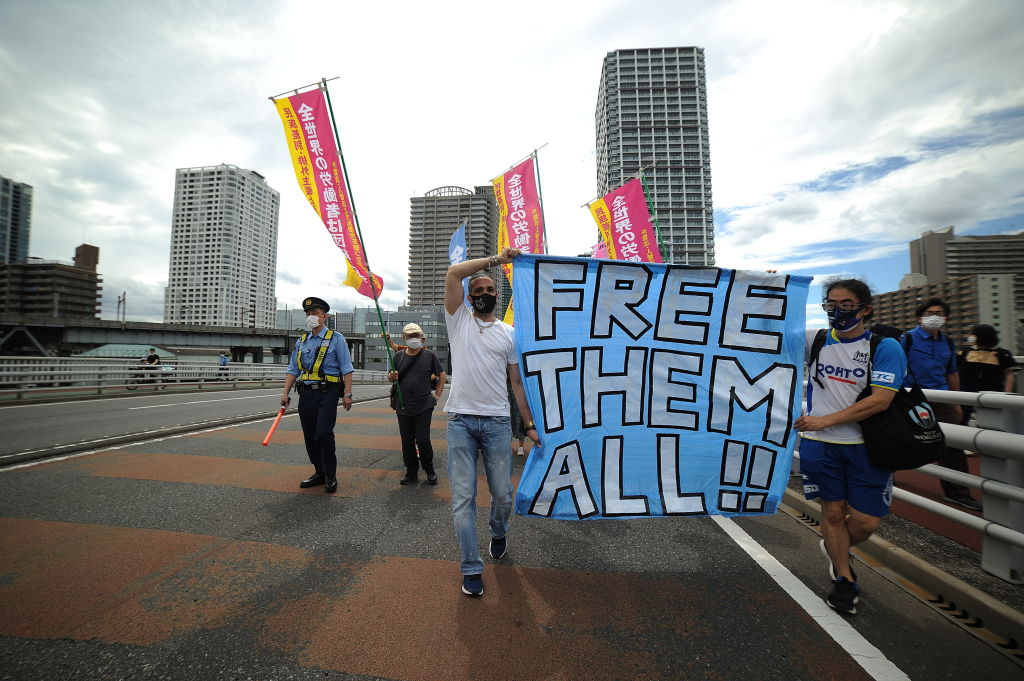
Some of the most gripping sports drama in Japan this week took place not at the Tokyo Summer Olympics, but at Haneda Airport.
Belarusian sprinter Krystsina Tsimanouskaya says she was taken there against her will after publicly criticizing Belarusian Olympic officials online. She was to be returned to Belarus, under the authoritarian regime of Alexander Lukashenko, to face the consequences.
She appealed to the airport police and the International Olympic Committee (IOC) and a standoff ensued. After a night at an airport hotel, she was brought to the Polish Embassy in Tokyo and granted a humanitarian visa. She boarded a plane, headed for Warsaw, on Wednesday.
The Belarusian case, which gained worldwide media attention, stands in stark contrast to how Japan treats thousands of refugee applicants who come to the nation of 126 million from impoverished or strife-torn countries—only to be turned away, or face years in legal limbo.
Refugees viewed as ‘threat’ to society

In 2020, Japan granted refugee status to only 47 out of nearly 4,000 applicants; another 44 were given special residence permits on humanitarian grounds, according to Ministry of Justice data. The figure of 47 was a 10-year high. In 2013, Japan recognized just six refugees; in 2014, 11.
The country’s uncharitable refugee policy remains in place despite the cratering of Japan’s workforce and the fact that millions of homes and other buildings in Japan lie abandoned. Both factors are due to the country’s aging population and low birth rates, which leaders have long recognized as a significant threat to the world’s third-largest economy.
“The Japanese government appears to be more focused on restricting and filtering as much as possible the number of refugees who are accepted into Japan, rather than to accept as liberally as possible on a humanitarian basis,” says Teppei Kasai, a Tokyo-based program officer at Human Rights Watch. “This is partly because the government believes many of those applying for refugee status are attempting to ‘cheat’ the system by lying about their circumstances, and that they somehow pose a ‘threat’ to Japanese society.”
READ MORE: For Japan’s LGBTQ Athletes, the Tokyo Olympics Are a Missed Opportunity
That’s how Gloria Nkechi Onyekweli felt. She arrived in Japan in December 2006 on a fake passport after fleeing Nigeria, fearing that government security forces were seeking her for being part of a group calling for self-determination for the Igbo people in the country’s Biafra region. Her fiancé had been shot and killed two months earlier.
Japan rejected her refugee applications multiple times, and instead detained her for a total of 30 months. She says she was physically abused during a struggle with guards who restrained her, and that a number of her friends, also refugee applicants, died of poor health in detention.
In March, a Sri Lankan woman, Ratnayake Liyanage Wishma Sandamali, perished in an immigration facility in Nagoya after complaining of a stomach ailment since January. Her death has highlighted criticisms of Japan’s immigration and refugee system.
Onyekweli lived in poverty in Kanagawa Prefecture outside Tokyo, subsisting on donations from a church group and occasional cleaning work. “I thought Japan would protect me, and that was why I stayed,” says Onyekweli. “My life was stuck for 14 years. No marriage. No child. No education. If Japan had given me education, I would have been appreciative of them.”
She was finally granted refugee status—not by Japan, but Canada. Bolstered by a crowdfunding effort led by Canadians, in late July she flew to British Columbia to begin a new life in a small town. She aims to start training as a healthcare worker in September.
A long history of asylum claims at the Olympics
Tsimanouskaya is the latest in a long line of athletes who have claimed asylum at major international sporting events. The fact that the 24-year-old was yanked from the Games to face possible reprisals in Belarus, a former Soviet state where mass protests erupted after allegations of fraud in the presidential election a year ago, evokes memories of other Olympics defections.
READ MORE: How a Belarusian Teacher and Stay-at-Home Mom Came to Lead a National Revolt
In 1956, about half of Hungary’s Olympic delegation defected following the Melbourne Olympics after hearing about the Soviet invasion of Budapest. Between 21 and 26 athletes and coaches went missing at each of the 2002 and 2006 Commonwealth Games, a sporting event of U.K. nations and former British colonies, as well as the London Olympics of 2012, when at least 82 athletes, coaches and delegates applied for asylum, from countries including Sudan and Somalia.
Tsimanouskaya was also not the first athlete in Japan this year who tried to flee their home country.
READ MORE: Myanmar’s Top Swimmer Boycotts the Olympics to Protest the Military Coup
Last month, Japan granted a six-month visa to a Myanmar soccer player who applied for refugee status after expressing solidarity with the anti-coup protest movement during a World Cup qualifying match in Japan in June. The approval came after the government passed a measure to prevent Myanmar citizens from being deported amid the military government’s violent reprisals against protesters.
And before the Olympics began, Ugandan weightlifter Julius Ssekitoleko went missing from his training camp in Osaka Prefecture. He reportedly left a note saying he had gone in search of work. He was found five days later and returned to Uganda, where he was detained by police to face possible fraud charges.
Japan under pressure to reform
Japan’s government has shown conflicting signs on its refugee policy going forward. This past spring, its parliament began debating a bill that would allow the country to deport foreigners who have applied for refugee status and been rejected three times. The revision was halted following an outcry in the media.
In July, Japan’s immigration agency signed a memorandum of cooperation with the U.N. High Commissioner for Refugees (UNHCR), which has long pushed Japan to help more asylum seekers, to improve its refugee system. The aim is a system that is “more fair, transparent and efficient,” says Yuki Moriya, an associate communications officer at UNHCR in Japan.
Observers aren’t holding their breath. “The UNHCR standards are merely the adoption of internationally accepted norms,” says Shogo Watanabe, a Tokyo lawyer who works on human rights issues. “Japan’s inability to do this simple thing [until now] is an indication that it’s unwilling to accept them.”
For Onyekweli, any changes will come as too little, too late.
“I feel so relieved to leave Japan,” she says from her hotel in Vancouver, where she was completing quarantine. “All the fear and sleepless nights and being afraid of tomorrow and returning to detention. I want to give back to the society that is giving a lot to me.”
More Must-Reads from TIME
- Donald Trump Is TIME's 2024 Person of the Year
- Why We Chose Trump as Person of the Year
- Is Intermittent Fasting Good or Bad for You?
- The 100 Must-Read Books of 2024
- The 20 Best Christmas TV Episodes
- Column: If Optimism Feels Ridiculous Now, Try Hope
- The Future of Climate Action Is Trade Policy
- Merle Bombardieri Is Helping People Make the Baby Decision
Contact us at letters@time.com